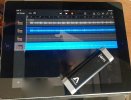OG_Blues
Guitar Geezer
I see that REAPER has an experimental release of its DAW for the Raspberry Pi platform.
It seems that this might offer the possibility of a very inexpensive DAW that would be suitable for
modest requirements and modest budgets, as well as the possibility of a very compact and maybe even portable DAW that provides features way beyond what you would have available in a more conventional
portable recorder.
I downloaded it and installed it on a Pi, and it came right up and ran. I haven't done any recording yet,
but will do so and see how it works. I may also load it onto my Pi in the little 7" touchscreen package
and see how that works - that would be a nice portable setup if it works well!
If anyone finds this interesting, I can continue reporting on what I find.
It seems that this might offer the possibility of a very inexpensive DAW that would be suitable for
modest requirements and modest budgets, as well as the possibility of a very compact and maybe even portable DAW that provides features way beyond what you would have available in a more conventional
portable recorder.
I downloaded it and installed it on a Pi, and it came right up and ran. I haven't done any recording yet,
but will do so and see how it works. I may also load it onto my Pi in the little 7" touchscreen package
and see how that works - that would be a nice portable setup if it works well!
If anyone finds this interesting, I can continue reporting on what I find.

